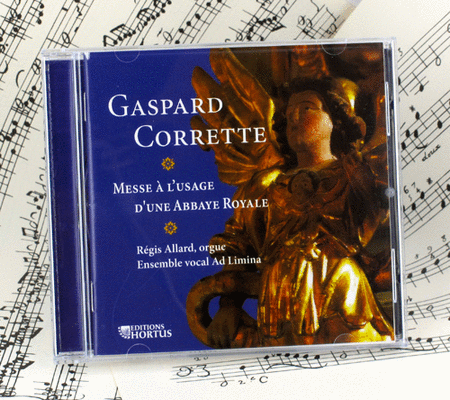Mass for use in a Royal Abbey - CD audio
Vocal Ensemble Ad Limina
-
Ships in 4 to 6 weeks
Details
Description
SKU: FZ.50529
Vocal Ensemble Ad Limina. Composed by Gaspard Corrette. Edited by Regis Allard. Book and CD. Published by Anne Fuzeau Productions - France (FZ.50529).12.5 x 14 cm inches.
Anne Fuzeau Classique propose to discover our facsimiles' music in CD. Regis Allard, historical organ of Saint Michel de Bolbec (Calvados). Mass in the 8th tone for organ - Gaspard Corrette. Processional of the Royal Abbey of Chelles - Guillaume Gabriel Nivers. Romano-Monasticum Gradual - Guillaume Gabriel Nivers. Divine Office for use by the Ursuline Ladies of Dijon - Charles Derey. Improvised verses on the organ, Regis Alard.
Alternating with Nivers's 'musical plainchant', Corrette's Mass sounds like a homage of the organ to itself, as it gracefully takes on the role of preacher of the Divine Cult.
Regis Allard was trained by Andre Isoir and Michel Chapuis (for several years he had private lessons with the latter) as well as at the Schola Cantorum in Paris, where he graduated. He devotes himself exclusively to the interpretation of early music and participates in numerous events centred on historic instruments in France, Spain, Holland and northern Germany. He was a prize winner in the International Competition of French Music in Toulouse. His first disk, with pieces by Heinrich Scheidemann on the Arp Schnitger organ in the Stade church in northern Germany, received a Choc from Le Monde de la Musique. His latest recording, J. S. Bach's Art of the Fugue under the Hortus label performed on the new instrument of the church Saint Louis en l'isle in Paris, received critical praise.
Ad Limina This group of women cantors, all trained in the Conservatory, themselves music teachers, choir directors, soloists, come from either side of the French-Swiss border, whence the name Ad Limina, which means 'at the border'.
This ensemble pursues a novel exploration of the paths of religious music, from the baroque period to our day, with emphasis on Gregorian plainchant and European music from the 19th century to contemporary creation.

 Share
Share